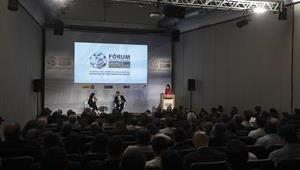Publicado em 24 de agosto de 2017
Infrastructure Forum marks the reaction of the economy
Event BROUGHT LECTURES FROM THE PRESSWOMEN Cristiana Lôbo AND THE economist Ricardo Amorim

The lecturers offered a show of information, making clear that the main current obstacle lies in the complex political scenario that seems not to be solved till the next elections for president and even after this period. However—and even considering this situation—the economy is giving signals of employment and consumption recovery.
The good news for the industry is that the performance of the agribusiness chain starts to result in a fresh impetus for industrial activities. Ricardo Amorim drew attention to the decentralization of the economy with the emergence of new productive areas, pointing that 19 of the 20 cities that generated occupations during the last months are located in the country’s inland. He also highlighted that the strength of the agribusiness pulled upwards the demand for investments in infrastructure, mainly to attend the needs of transport in the new agricultural borders, especially considering that the country’s inland has a historic deficit of infrastructure.
Economy going up and politics going down: how can this be explained?
Cristiana Lôbo pointed out that the future of Brazilian scenario is completely unknown. She emphasized that the main difference between the present and the past rests in the lack of political leaderships that could lead the country through this “crossing”—word used by her. She emphasized the unpopularity of president Michel Temer and the erratic decisions that affect the economy, such as the recent speculation about tax rising and the scandal involving JBS corporation.
She made clear that the main bottleneck for retaking the economic growth of the country is just the political question, for which there is no clear signaling about the courses that may be taken by the country in short or medium term.
The lecturer pointed out the impossibility of political renewal in Brazil—as occurred in France with the election of Emmanuel Macron—considering the current rules, with no link with the parties. And he remembered that the political reform defended by the congressmen does not foresee a change in this scenario.
Cristiana Lôbo criticized the lack of regulatory marks and of legal safety that could attract investments in infrastructure involving high volume of resources and large deadlines for return. She spoke about the intervention—issued by decree of the former president Dilma Roussef—in the model of concessions of the power industry that ended to destroy it. In her opinion, this type of intervention serves to show the force of Brazilian presidential system and at the same time shows how vulnerable are the laws, contracts and rules of the country for investments involving private capital.
The opposite situation occurs in Chile, where a tradition of stable rules is independent from the political trend of the current ruling party. This is its main factor of attraction for external investments.
Speaking about the fiscal deficit that—in her opinion—is another huge obstacle for Brazilian development, Cristiana Lôbo pointed out the huge deficit in the welfare of public service labor unbalancing public accounts, and in the difficulty of governing authorities and politicians to promote changes in this field due to the own interests or the political force of the area, generating a situation where a majority supports the privileges of a minority.
2017 may still bring surprises: increase of 5%
According to Ricardo Amorim, Brazilian economy has already overcome the zero level of the economic crisis and starts to send clear signals of recovery, with possible increase in the GDP still in this year. This trend of recovery, however, was clearer at the beginning of this year but the expectations were reduced after the accusations of corruption involving president Michel Temer, carried out by JBS, that put again the country in a cloudy scenario. Economic indicators are stabilizing little by little, pointing to a detachment of economy in relation to politics. But obviously this has a limit.
Amorim highlighted the recent news of job retaking, low inflation, exchange stability, movement of banks to increase credit, attraction of external investments, agribusiness performance and redemption of the industry with restart of the industrialization process.
He also pointed out the need of changes in the social welfare, that is one of the main obstacles to solve Brazilian fiscal issues and that will continue to be a critical point in the future if the changes are not carried out or are implemented partially. “Welfare will be rebuilt several times”, said him.
He traced a time line to show that a growing pattern of the economy occurs immediately after the end of each crisis in the country, always around seven percent. According to Amorim, this cyclic motion strengthens the belief that Brazil may reach a growth rate up to five percent this year, unless any other “new dramatic fact” occurs in the political field.
Agribusiness: the new Brazilian miracle
Ricardo Amorim also explained that the Brazilian crisis is not due to any external factor, considering the growth of emerging nations as a parameter. But he pointed out that—in spite of its economic problems—Brazil is a point of wide interest of international players. This justifies the input of external investments even in one of the most critical moments of the country, the affair involving JBS and Temer.
The analyst explained that one of the main consequences of this economic growth of emerging countries is a strong increase in food demand coming from nations such as China and India, increasing profits of Brazilian agribusiness. He also remembered that Brazil has 33 percent of the agricultural area and 20 percent of the water sources of the world, what means a strong capacity of agricultural production. For him, the economic performance of emerging countries caused a direct increase in the consumption power of their population, mainly of food consumption. And the increase in their wages brought some indirect benefits to Brazil, which became competitive again in some areas. Economic poles that were succumbed to the crisis and to Chinese products, such as the cities of Franca/SP (footwear); Joinville/SC (automotive); Caxias do Sul/RS (metal-mechanics), came again to life.
Amorim celebrated that the Brazilian agribusiness starts to enter in a phase of product industrialization. This will increase the investments in infrastructure to attend this explosion of commodity production in Brazil. He also instigated infrastructure businessmen to take advantage from the opportunities that are opening with this economic oxygenation and this new Brazilian agribusiness profile that reverses the flow of development from the cities to the field. And he ended his speech warning that they do not have to wait for new opportunities, but look for and create their own opportunities before the competitors do it.

Av. Francisco Matarazzo, 404 Cj. 701/703 Água Branca - CEP 05001-000 São Paulo/SP
Telefone (11) 3662-4159
© Sobratema. A reprodução do conteúdo total ou parcial é autorizada, desde que citada a fonte. Política de privacidade


